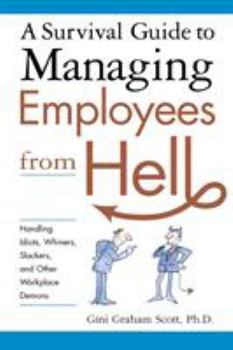A Survival Guide to Managing Employees from Hell: Handling Idiots, Whiners, Slackers, and Other Workplace Demons
Select Format
Select Condition 
Book Overview
From whiners and wastrels to the needy and nefarious, this helpful and humorous guide gives you the tools you need to handle any type of difficult employee. All managers get saddled with "problem" employees from time to time, but what sets great managers apart is how they deal with them. Drawing from real-life stories, A Survival Guide to Managing Employees from Hell provides you with practical advice for handling a wide...
Format:Paperback
Language:English
ISBN:081447408X
ISBN13:9780814474082
Release Date:December 2006
Publisher:Amacom
Length:224 Pages
Weight:0.85 lbs.
Dimensions:0.7" x 6.0" x 9.0"
Age Range:15 years and up
Grade Range:Grade 10 and higher
Customer Reviews
2 ratings
A 'must' for managers
Published by Thriftbooks.com User , 17 years ago
A 'must' for managers is Gini Graham Scott, Ph.D.'s A SURVIVAL GUIDE TO MANAGING EMPLOYEES FROM HELL, telling how to handle a typical problem employee. Humor blends with practical, life-tested advice for handling different types of employee issues, from the clueless incompetent to the party-time performer who can't seem to separate work from fun. Case histories blend with advice and techniques from the field in a manual key to any level manager's success.
A common-sense approach to the difficult employee
Published by Thriftbooks.com User , 17 years ago
We have all known the "employee from hell" in all of his or her guises: the complainer, the egomaniac, the troublemaker, the passive-aggressive type, the clever con artist, and many more. In this plain-spoken book, management consultant Gini Graham Scott categorizes bad employees into some three dozen pigeonholes (like the "impossible intern," the "negative Nelly," and the out-and-out liar) and assigns each a brief chapter that opens with a succinct case study. In each setting, Scott asks the same question: Did the boss handle the situation well? Should she have fired the employee on the spot, put him on probation, called a staff meeting, had a one-on-one conversation with the troublesome employee, let the whole thing go, or done something else entirely? Scott's advice springs largely from common sense. She acknowledges that there isn't just one way to handle a difficult worker. A good deal depends on the office atmosphere, the employee's and boss's personalities, and other intangibles. In discussing a saleswoman who gives so much attention to the first customer of the day that she neglects her duties to other customers, Scott suggests a variety of steps: giving the worker one more chance, explaining that she will be fired if she doesn't change, clarifying where she has gone wrong, asking another employee to monitor her behavior, and rewarding her with small bonuses if her performance improves. Of course, some problematic behavior - drug use on the job, stealing from the employer, a pattern of lying -- can't be tolerated, and Scott urges that supervisors should fire people who do those things, even if the employee is a friend, or the friend of a friend. Still, there are a number of ways to dismiss someone, and Scott insists that even a fireable employee should be shown the door graciously.





